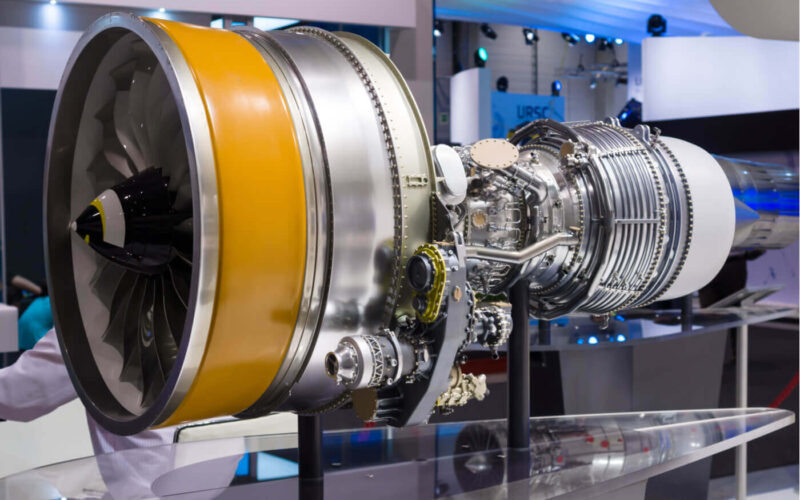The Irkutsk Aviation Plant has completed assembly of a new MC-21-300 aircraft fuselage. While the fuselage is the fifth already and three prototypes are already in flight testing, what is special about this particular prototype is the fact that it would be the first one equipped with a new type of engines. This time, the engine would be made in Russia.
The Irkutsk Aviation Plant broke the news about the latest MC-21-300 fuselage completion on December 10, 2019. The aircraft still needs to have systems as well as wing and tail consoles installed before it begins testing. Once it does, it would be the first MC-21 in testing equipped with Russian Aviadvigatel PD-14 engine.
Currently, there are four test aircraft already in action, all of them powered by American
Pratt & Whitney PW1400G-JM engines. The latest, fourth, prototype was rolled off the assembly line and was transferred to flight test facility on November 28, 2019. Initially, it was this aircraft that was supposed to rely on the Russian engine, but plans were later abandoned in order not to delay the MC-21 program further than it already is.
Now, with the fifth MC-21 prototype aircraft in progress, the Aviadvigatel PD-14 engine enters the scene.
Aviadvigatel PD-14 engine
The PD-14 engine is the first completely Russian engine for civil airliners created in Russia since the 1980s. Designed by Aviadvigatel and manufactured by the Perm Engine Company (both companies belong to the United Engine Corporation, UAC), it is specifically designed to power the MC-21-300 aircraft.
The PD-14 would generate 137kN of thrust for take-off. Among the main competitive advantages of PD-14, the engine features lower exhaust temperatures of combustion chamber, according to Aviadvigatel, which also emphasises that the solution helps to save on operating costs and reduce risks.
The engine also has a smaller diameter (190 cm) to reduce engine mass and drag of the nacelle, an “optimal” internal circuit dimensions and “sufficiently high” degree of fan compression, which eliminates the need for an adjustable external circuit nozzle, the manufacturer highlights.
Just like the MC-21-300 is expected to be the first airliner in a series, so is the PD-14 seen as the basis version of the engine family, which will power the Russian airliners. In September 2019, UEC deputy director told RIA Novosti that MC-21-400 would be powered by PD-16, a modified power plant based on the PD-14. Reportedly, the newer engine would have an increased bypass ratio of the fan. However, the manufacturer’s website lists the engine which will eventually power the MC-21-200 simply as PD-14A, while MC-21-400 powerplant-to-be is called PD-14M.
The flight tests have started in 2015. The PD-14 was certified by Russian authorities in the fall of 2018. The following step, obtaining certification by the European Union Aviation Safety Agency (EASA), is expected in 2020.
Flight tests of the MC-21 with Russian engines are scheduled for the first quarter of 2020, while the first PD-14-powered MC-21 is expected to enter service with Aeroflot in 2022.
Made in Russia with a little help?
Remember the part where PD-14 was supposed to be the first completely Russian engine? Well, the extent of the claim could now be questioned after the U.S. authorities launched a criminal complaint against a high-ranking United Engine Corp (UEC) official in a corporate espionage case. The subject matter in the case in none other than jet engines.
In September 2019, the U.S. Department of Justice (DoJ) announced that two people ‒ a Russian and an Italian nationals ‒ have been charged in the United States with conspiring and attempting to steal trade secrets from an American aviation company, GE Aviation. One of the two people is identified as Alexander Yuryevich Korshunov, an employee of UEC.
The PD-14 manufacturer Aviadvigatel is a subsidiary of the Russian state company.
Between 2013 and 2018 GE Aviation’s Italian subsidiary employees were hired to do consulting work related to jet engine accessory gearboxes for the two accusees (including Korshunov), as outlined in the statement by the Department of Justice.
The employees’ statements of work typically said that the “the holders of patent and intellectual property obtained as a result of the work are…the Ministry of Industry and Trade of the Russian Federation,” according to DoJ.
However, the employees hired for the consulting work allegedly used GE Aviation’s trade secrets to create technical report. The effort, in DoJ’s belief, was focused on external engine components, accessory gearboxes, that provide power to systems such as hydraulic pumps, generators and fuel pumps.
Aviadvigatel has previously raised suspicions of another U.S. authority, the Department of Commerce, which “entity listed” the company in September 2018, alledging it was acting contrary to the national security or foreign policy interests of the United States.
It must be noted that criminal complaint contains allegations, meaning that Korshunov and the other person accused of corporate espionage are presumed to be innocent unless proven guilty in a court of law.
The MC-21 is a medium-haul plane capable of carrying between 132 and 211 passengers. Seen as a replacement to the Tu-154 and Tu-204 aircraft in Russia, it is designed to compete with the Boeing 737 and the Airbus A320.
The program has been plagued with delays that the Russian government mostly attributed to American sanctions.
The first MC-21 prototype made a maiden flight in May 2017. In current estimations, the aircraft could be certified in Russian in 2020 and obtain EASA’s certification the following year.

